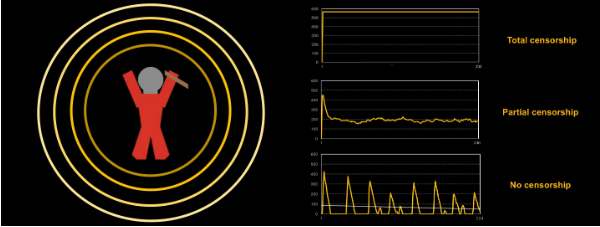[Update July 27, 2012: so far, our study has been featured in a number of media outlets in UK, India, Algeria, US, Oman, Indonesia… These are just the ones we know of: The Daily Mail, Yahoo Lifestyle, CNN, Technorati, The Times of India, GigaOM, Buzzfeed, National Affairs, Sify News, Phys.org, Science Daily, Zee News TV India, Oman Tribune, The Free Library, L’atelier, Sciencenewsline, Le Soir d’Algérie, Tempo Indonesia. We’re particularly impressed by this response, and would like to thank the researchers, journalists and activists who’ve been spreading the news.]
Hello everyone,
You have probably reached this page after reading in the international press about our study “Social Media Censorship in Times of Political Unrest – A Social Simulation Experiment with the UK Riots” (published in the journal Bulletin of Sociological Methodology, vol. 115, n. 1). This post will provide some background information.

Read the study
First of all, if you are interested in reading the paper, you can purchase the article from SAGE website. Anyhow, here’s a preprint version you can download for free. Just saying.
About the authors
If you are looking for the authors’ bios:
Antonio A. Casilli, is an associate professor of Digital Humanities at Telecom ParisTech and a researcher in sociology at the Edgar Morin Centre (EHESS), Paris, France. He is the author of the social media theory book Les liaisons numériques [Digital Relationships], published by the Editions du Seuil. He blogs at Bodyspacesociety.eu, tweets as @bodyspacesoc, and is a regular commentator for Radio France Culture. You can contact him here.
![]() Paola Tubaro, is a senior lecturer in Economic Sociology at the Business School of the University of Greenwich, London, UK, and associate researcher at the Centre Maurice Halbwachs (CNRS) Paris, France. Economic sociologist with interest in social networks and their impact on markets, organisations, consumer choice and health, her research also includes work in the philosophy and methodology of economics and social science. Her blog is here, plus you can contact her here.
Paola Tubaro, is a senior lecturer in Economic Sociology at the Business School of the University of Greenwich, London, UK, and associate researcher at the Centre Maurice Halbwachs (CNRS) Paris, France. Economic sociologist with interest in social networks and their impact on markets, organisations, consumer choice and health, her research also includes work in the philosophy and methodology of economics and social science. Her blog is here, plus you can contact her here.
The story, so far
In the wake of the August 2011 UK uprisings, Casilli and Tubaro built a rapid response study. Using computer simulation, the investigators showed that any move by the government to censor social media was likely to result in more civil unrest, higher levels of violence, and shorter periods of social peace. Released as a joint post on their websites and subsequently available as a working paper on SSRN (Social Science Research Network), the study was widely shared online and in the press.

Such an enthusiastic response prompted them to continue their research. Presently, they are launching follow-ups and new developments, both empirical and theoretical, in other European and MENA countries. They are members of the scientific committee of Just-In-Time Sociology (JITSO), an EPFL Geneva-based program gathering international researchers that try “to understand social phenomena as they unfold”.
TEDx talk, simulations and other stuff
If you want to watch a video presentation of the study, here’s Antonio Casilli’s TEDx talk (in French, with English subtitles), “Studying censorship via social simulation”, TEDx Paris Universités, May 19, 2012.
If you want to know more about our ongoing research, Internet Censorship and Civil Unrest (ICCU), here’s the project’s wiki.
If you want to download the computer simulation, here you’ll find a detailed technical description of the model. The model file (Netlogo and Java applet versions) is available here . You should: 1) unzip and save all three files in the same directory; 2) either open the .nlogo file from your computer in Netlogo, or open the .html file in your browser).
Enjoy!